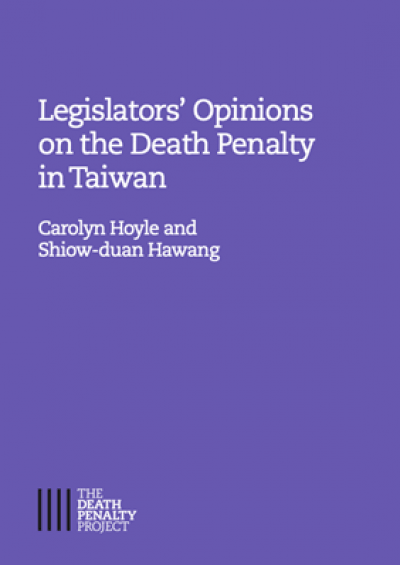Since the late 1990s there has been a steady decline in the number of executions carried out in Taiwan; 384 from 1989-99, falling to 73 over the course of the following decade. In 2006, Taiwan abolished the mandatory death penalty and in 2009 took the progressive step of adopting the International Covenant on Civil and Political Rights (ICCPR) as a matter of domestic law. In voluntarily agreeing to conform to the standards and objectives of the ICCPR, Article 6 of which concludes that “[n]othing in this article shall be invoked to delay or to prevent the abolition of capital punishment by any State Party to the present Covenant”, Taiwan has committed to being on an “irrevocable path towards total abolition of the death penalty in the foreseeable future”. However, progress towards abolition has stalled as a further 35 people have been executed since 2009. The last was Weng Jen-hsien who was executed for murder in April 2020.
The Death Penalty Project has worked in Taiwan for over a decade and met with members of President Tsai Ing-wen’s Democratic Progressive Party government, who have reaffirmed a commitment to the eventual abolition of capital punishment but have cited apparent public support as their primary reason for hesitancy.

In 2019, The Death Penalty Project, in partnership with the Taiwan Alliance Against the Death Penalty (TAEDP), published two pieces of research on Taiwan’s use of capital punishment. The first, a report on unsafe convictions, evidenced alarming failings in the criminal justice system and highlighted a real risk that innocent people could be killed by the state. The second examined public attitudes towards capital punishment and revealed that 71 percent of people in Taiwan, despite initially being in favour of retaining capital punishment, would not oppose abolition of the death penalty if it was replaced with life imprisonment without parole. That research also demonstrated that people’s initial support fell dramatically when information was provided on wrongful convictions, error in the administration of the punishment, and when realistic case scenarios were considered. The research strongly indicates that public support for the death penalty is not deeply entrenched, exists in the abstract and is not sustained when contextualized.
The findings of those studies are highly significant both in evidencing grave risks in the system and in demonstrating nuance and flexibility in public opinion, regarded as the central obstacle to abolition.

To explore other factors that could be impeding Taiwan’s progress towards abolition, in 2020, The Death Penalty Project and TAEDP collaborated with the University of Oxford and Soochow University to conduct a further study examining the views of Taiwan’s legislators. Today, we launch that report in Taiwan and hope it might shift the discourse on the retention of capital punishment.
Navigating the many challenges posed by COVID-19, we contacted all of Taiwan’s 113 legislators, a third of whom were able to take part in face-to-face interviews aimed at explicating complexities in attitudes to capital punishment and the criminal justice system.
The study revealed a remarkable finding - 61 percent of those interviewed are in support of abolishing the death penalty, and of the 39 percent against, only one legislator felt strongly that Taiwan should keep capital punishment.
The research sought to provide further context, demonstrating legislators to be well informed on the issue, with those in favour of abolition more informed than those against. Many were aware of the intrinsic risk of wrongful convictions and of the serious concerns raised in our 2019 report. The rationales of the majority of those in favour of abolition were concerns over human rights violations and the risk of executing the innocent.
The research showed that most legislators have low levels of trust in the Taiwanese criminal justice system and doubted its ability to offer adequate safeguards to those facing execution. Disturbingly, most of the legislators believed wrongful convictions ‘sometimes’ occur and only 11 percent were satisfied that they rarely occur in Taiwan.
Social justice measures such as poverty reduction, mental health interventions and improved moral education of young people were preferred over capital punishment by all legislators when they were asked to rank the most effective policies to reduce serious crime - only one individual chose ‘more executions’.
Despite their own reservations, legislators’ presumptions about strong public support for capital punishment influenced their views on retention. Researchers presented legislators with the findings from the public opinion study published in 2019 that showed, among other things, that the vast majority of the public (71%) would support abolition of the death penalty if it could be replaced with life imprisonment without the prospect of parole. We then asked them again for their position. Having considered the evidence showing an openness to abolition among the public as well as the public’s own distrust in the criminal justice system, support for abolition jumped from 61 to 81 percent, an overwhelming majority. Support for retention dropped to 19 percent with no one remaining strongly in favour.
These are groundbreaking findings that show not only do legislators in Taiwan support abolition, but also how that support can be bolstered by the introduction of research revealing the limits of claims of public support for the death penalty, which are significantly overstated.
Political will and principled leadership are crucial to bringing about an end to the death penalty, and as an influential group with the power to enact lasting change, legislators could play an important role. Having voiced their support for abolition and in so doing, acknowledged the real risk of wrongful convictions and systemic concerns about the administration of justice, now is the time for legislators to act and share these concerns with the public.
We hope the latest study will reassure Taiwan’s leaders that there is currently a will to bring about change. Taiwan has recognised the benefits of adhering to international human rights standards, distinguishing it as an emerging model for democracy and human rights in the region. Abolition of the death penalty would further strengthen Taiwan’s position and cement its international reputation and standing with other like-minded democracies.
Taiwan, like all other nations that retain the death penalty, cannot administer it safely and fairly. Knowledge of that persuades both public and elites that any potential benefits of retention are outweighed by the pitfalls. Politicians have expressed a desire to abolish capital punishment and we now know that neither public opinion nor legislators’ views present a barrier to abolition. Indeed, given their support for abolition of the death penalty, legislators could be particularly influential in shifting discourse and, ultimately, death penalty practice in Taiwan.
Saul Lehrfreund is Co-Executive Director of The Death Penalty Project.
Carolyn Hoyle is Professor of Criminology in the Centre for Criminology, University of Oxford and Director of the Death Penalty Research Unit (DPRU).
The 'Legislators' Opinions on the Death Penalty' report can be read in full on The Death Penalty Project website here.
Share:
